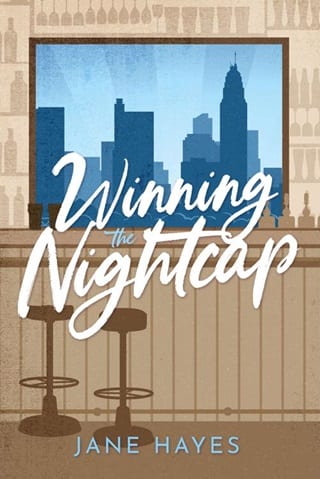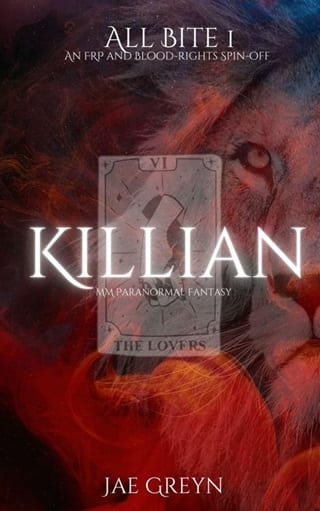Chapter 11
Hailey
Sunlight pierces the gap between my curtains, pricking at the edge of my consciousness. I roll over and squint at the clock. It’s after nine. My eyes pop wide. That can’t be right. Confusion tugs at my sleep-fogged brain. I never sleep this late. The house is always awake by seven, stirred into motion by Addison’s chirpy summons on the baby monitor. Speaking of which… Why is it so silent?
I sit up, heart hammering, and notice the monitor’s dark screen. Off? It’s never off. Panic coils in my stomach as I throw back the covers and bound across the room. I race to Addison’s room. Empty .
The scent of coffee drifts up the stairs, a bright spot in my dread. I follow it downstairs, and then I hear it—Christian’s voice, gentle and melodic, singing the “Itsy Bitsy Spider.” Relief washes over me in an overwhelming wave, followed closely by embarrassment at my overreaction. She does have a parent. Could it be that he actually wants to be one? Rounding the corner to the kitchen, I find Addison snuggled into the swing, giggling with delight as Christian makes exaggerated gestures with his long fingers climbing up an invisible waterspout.
“Good morning,” I say, my voice sounding too loud in the cheerful domestic scene. “I’m sorry. I didn’t mean to oversleep.”
Christian turns, offering a smile. “Don’t worry about it,” he says. “I turned the monitor off. You looked like you could use the sleep.”
Surprise widens my eyes, but I’ll take it. “Thank you,” I mumble.
“Everyone deserves a break now and then,” he replies, rising to pour himself a cup of coffee.
Who is this guy, and what did he do with Christian Bradford?
He gestures to the coffee carafe, asking if I want one too, and I nod. “Besides, we’ve got plans today,” he continues as he hands me a mug. “We’re heading to Stanley Park and the aquarium. You can take the day off if you want. Or…” he trails off for a moment. “You’re welcome to join us.”
The offer hangs in the air between us, surprising yet sincere. A day off sounds tempting, a chance to recharge, but the thought of spending some less-pressure time with Addison—and yes, with Christian too—pulls at me. And it’s not like I could come up with something to do on the fly. Dana is swamped with a big work project.
“Thanks,” I say. “I’d love to come along if that’s really okay.”
“Of course it is,” Christian says, and there’s a warmth there I rarely see. “We’d like having you there.” Addison beams up at me.
“Then it’s settled,” I reply, unable to contain a small smile of my own. I run my fingers through my hair, still tousled from sleep. “Do I have time for a shower?”
“Sure,” he says. “The aquarium doesn’t open for members for another hour.”
I nod and hurry upstairs. I don’t know what any of this means, but it feels good. The hot water is a welcome shock, washing away my lingering drowsiness. I dress hastily, nerves prickling at the thought of spending an entire day with Christian. For once, my day won’t be just about watching Addison, but about being with both of them.
By the time we’re all loaded into the minivan, I’m a bundle of quiet anticipation. Christian navigates the streets while Addison’s laughter fills the space between us. Soon we arrive at the Vancouver Aquarium, a place that’s become almost as familiar as home.
We wander to the jellyfish exhibit first, and Addison’s eyes widen at the ethereal creatures pulsing gently behind the glass. This is her favorite exhibit. I can’t blame her. The room is lit with blacklights, and the jellyfish glow as they float in floor-to-ceiling aquariums.
When Addison grows restless, we move toward the next exhibit. A high-pitched screech cuts through the crowd as we approach the tank of sea life from local waters.
“Mommy, it’s wet!” a young girl cries, soaked from head to toe. An octopus, its tentacles waving wildly, has somehow escaped its enclosure and splashed her. Staff members are already converging on the scene, but the poor girl is inconsolable.
“Stay back,” Christian instructs, placing himself between us and the commotion.
In the ensuing confusion, the little girl slips on a puddle, her small body hitting the floor with a thud that sends a collective gasp through the bystanders. Without hesitation, Christian is at her side, shifting into clinical focus.
“Hey there,” he says softly, checking her over. “Can you tell me your name?”
“Mimi,” she whimpers, clinging to her mother.
“Okay, Mimi, you’re doing great.” He runs his fingers over a bump on the back of her head. Then he turns to her anxious parents. “She has a pretty big bump, but I think she’ll be fine. Keep an eye on her. If she vomits or becomes unusually sleepy, take her to Mercy’s emergency room immediately. Do you know where that is?”
They nod. “Thank you…” The mother trails off expectantly, seeking a name.
“Dr. Christian Bradford,” he supplies, helping Mimi to her feet. Her parents thank him again, gathering their daughter in their arms.
The aquarium staff have the wayward octopus contained and are repairing the aquarium so the other octopi don’t escape.
Addison fusses, ready to move on from the drama.
“We’re moving,” Christian assures her, offering me a smile.
We resume our path toward the playful otters, and I steal a glance at Christian. I’ve never seen him in doctor mode before, and I’m impressed by his calm under pressure. Usually, someone who tells you how important they are is compensating for something—and perhaps he is—but it doesn’t seem to be medical skill.
A woman who was in the octopus crowd nudges my arm as we pass. “You’re so lucky your husband is a doctor,” she says, a note of envy in her voice. “Kids are so tough.”
My lips part to correct her—Christian isn’t my husband, and I’m just the nanny—but his hand comes to my other arm, halting my words before they take flight. He meets my gaze and shakes his head subtly. “It’s too hard to explain,” he murmurs once the woman moves on, a wry smile touching his features.
It doesn’t seem particularly complicated to me. I’m the nanny, and he’s my boss. But I let it go, pushing the oddity down to stir a quiet pool of questions. “Addison, look at those fish!” I point to a vibrant school darting past the glass, redirecting her attention and mine from the lingering confusion.
As we amble along, I glance up at Christian. “Can I ask again about your family? Why don’t you have your dad’s last name?”
He takes a moment to respond, his eyes distant. “My mother comes from wealth,” he says. “She and my dad were young when they fell in love, but my grandparents… They put a lot of pressure on them.”
“Pressure?” I echo, watching his jaw tighten.
He nods, looking down at Addison. “They never approved of my father, even went as far as paying him to disappear from our lives. That’s when they changed my last name to my mother’s maiden name.”
I struggle to wrap my head around such a callous act. John, Christian and Dana’s father, is such a kind man. Why would they push him away? “Sounds complicated,” I murmur, unsure what else to say.
“Complicated doesn’t even begin to cover it.” His laugh has no humor. “Let’s see what’s over here,” he suggests, a clear effort to step back into the present.
“Sure,” I agree, but as we walk, I still feel the weight of the memories he must carry.
For now, though, Christian seems relaxed, his attention mostly on Addison. She points at a colorful fish, her finger smudging against the glass.
I try to focus on Addison as well, but my mind replays the conversation about his family. “So, your dad… You didn’t know him growing up?” I ask, treading cautiously.
Christian hesitates, then nods as we turn away from the glowing tanks. “Yeah, he was more of a concept than a person for most of my life.”
“That’s so strange. I feel like I’ve known him forever. Not having him in your life must’ve been tough,” I say.
“Didn’t really have anything to compare it to,” he admits, shrugging. “But, uh, things changed when I was a resident. My mom’s dad—my grandfather—needed heart surgery, and suddenly, there was my dad, standing right there in the hospital. He believed in me from the very beginning.”
“Did he try to reconnect with you then?”
He glances down at Addison, who’s become engrossed in a display of seashells. “He tried,” he says softly. “But my grandfather loved to tell me how my father had taken their money and disappeared. So when he reached out, I resisted. But he was persistent.”
“That sounds like John.” I find myself holding my breath for a moment. “He pushed back hard when I quit school after my grandmother died. He knew that wasn’t what she’d would have wanted, but Franklin was chirping in my ear.” I shake my head. I don’t even know how that happened now. “What a mistake. But John’s never once said, ‘I told you so.’”
Christian smiles sadly. “He’s not a bad man. He just made choices, like everyone does.”
I nod, understanding that forgiveness is a journey, and sometimes a long one.
Christian’s gaze shifts to a nearby bench, where an elderly couple eats ice cream. “My mother, though…” He shakes his head. “She has her own ways of dealing with things.”
“Like what?” I ask, sensing another piece of the puzzle about to fall into place.
“Money can solve problems, or at least, that’s how she sees it. If something bothers her, she writes a check, and it goes away.” A hint of resignation colors his words.
“Must be nice,” I joke, but my humor falls flat.
“Sometimes,” he concedes. “But not always. It can’t buy everything.”
His eyes meet mine, and I realize he likely knows this truth all too well.
“Right,” I say, making a mental note. His mother’s coping mechanism speaks volumes about her character and perhaps about the kind of love and care Christian received as a child. There’s yet another layer in his complex family situation.
Addison kicks her legs in her stroller. She knows we’re heading to the otters—her favorite habitat. As they move forward, I watch the way Christian interacts with his daughter—gentle, patient, and encouraging. It’s a side of him that’s entirely new in the past week or so, and though I don’t understand it, I’m not about to complain. It softens the edges I’ve come to associate with him.
“Christian?” I venture. “What does your mother think of Addison?”
He watches a school of silver fish dart back and forth. “She’s my daughter,” he says. “For now, that’s enough. But as she gets older, it’s going to be harder for her.”
“Harder? Why?” I ask, though I’m not sure I want to know the answer.
“Because in my mother’s eyes, Addison isn’t perfect. And my mother only likes perfection.” He says this matter-of-factly, but there’s an undertone of sadness that tugs at my heart.
Perfect is such a strange word, so final and unforgiving, so unattainable. I look down at Addison, who is now giggling at the antics of the otters who seem to be playing tag as they race around their enclosure. Could anything be more perfect than her joy, her innocence?
“Addison is perfect,” I assure him. “She may have some developmental delays, but she’s making great strides, and she’s happy. Isn’t that what everyone wants? To be happy?”
For a moment, he just looks at me, and something flickers across his face. Then he nods, a smile on his lips. “You’re right, Hailey. That’s exactly what we all want.”
I return his smile, feeling hopeful that I’m breaking through the walls this man has built around himself. But I’ve had these hopes before, and they don’t always pan out.
The aquarium’s glow eventually wanes as Addison’s energy does the same. By the time we’re back at Christian’s townhouse, she’s ready for her nap. I feel the weight of the day’s revelations pressing on my shoulders as much as the physical weight of Addison in my arms.
When we get inside, Christian takes her from me, his touch light, and heads toward her nursery. I follow, unsure what else to do. “Thanks for coming with us,” he murmurs.
I nod, unable to find words that don’t feel too heavy or too revealing for the moment. It’s happening again. That pull between us. The way Christian’s looking at me, the way the air changes when he’s near. Part of me wants to give in, to let whatever this is between us take over. But what happens after that? There’s no path forward. What path would I even want? So I can’t. I won’t.
I watch as he places Addison in her crib. She deserves better than the mess her caregivers could create. And so do I.
After all, I’ve been here before, standing at the edge of something that feels exciting, dangerous, and easy to lose myself in. With Franklin, I let my heart lead the way, ignoring every red flag, every warning sign, until I was drowning. But now, I’ve worked too hard to rebuild myself, to find solid ground again. I can’t afford to let myself get involved with someone who might never be what I need.
I turn away from Christian, trying to put distance between us, physically and emotionally. But I can feel his eyes on me as I step into the hallway, and it takes every ounce of strength I have not to turn back.
“Why do you keep doing this?” he says, his voice low as he comes after me. “Why do you keep pushing me away?”
My heart clenches because he sounds hurt. I never wanted to hurt him. But why on earth does he want me? I have to protect myself. I have to put me first for once—and Addison. She’s counting on me, and I can’t afford to get lost in someone else’s mess again.
“Because I have to,” I whisper, keeping my back to him. “We need to avoid making things…complicated.”
He steps closer, and I force myself to turn, not move away again. His eyes search mine for something I’m not willing to give. “It doesn’t have to be complicated,” he murmurs.
But I shake my head. “It already is,” I tell him, my voice stronger now. “You have your life. Your work. And there’s Addison. I need this job. I need to be what she needs. I can’t afford to get caught up in something that could fall apart.”
His jaw tightens, and frustration flickers across his face. But he doesn’t argue. He just stands there.
It’s killing me, this push and pull. Despite all my questions today, I still don’t understand him, don’t know what drives him. I look away, my chest tight. “Addison is the priority right now. We can’t risk messing that up.”
Christian finally steps back, giving me space. “I get it,” he says, his voice low, resigned. “You’re protecting yourself. I just wish you didn’t feel you had to protect yourself from me.”
How can he not see this the way I do? If he doesn’t, it just proves we’re not on the same page, don’t have the same priorities. It seems obvious that Christian and I could never work the way I’d need us to.
“I’ve been here before,” I say, finally meeting his gaze again. “I know how this goes. And I won’t let myself get lost in someone else’s life again.”
He watches me a moment longer, and I can see the conflict in his eyes. But I hold my ground. I have to be strong—for Addison and for myself.
Finally, I escape to my room. I strip the sheets, methodically pulling each corner free and letting the fabric fall to the floor. The routine of laundry is comforting, a simple certainty I’m sure how to navigate. I shove the sheets into the washer, pour in detergent without measuring, and start the cycle.
With the laundry churning, I move to the kitchen. Dishes from breakfast still linger in the sink, and I attack them with more vigor than necessary. I scrub the dried food from the plates, lost in the monotony until a splash of water jumps across my chest, leaving an embarrassing splotch on my white T-shirt.
Christian chooses that moment to walk in. His gaze moves to the water stain, and I cross my arms over my chest, heat flooding my cheeks. He clears his throat, eyes shifting away, suddenly clouded with something unreadable. “I’m going for a run,” he says, voice terse. “I’ll be back before dinner.”
“Okay,” I reply, pulse racing.
“Let’s order in tonight. Indian sound good?” He’s already halfway to the door, keys jangling in our awkward silence.
“Sounds great.”
“Order from Tandoori Palace in Richmond. I’ll pick it up at six.” His decisive tone has returned.
“Sure. What do you want?” I ask, eager to smooth over this wrinkle, to prove we can still be friendly. Everything is fine .
“Chicken tikka masala, lamb vindaloo, and lots of naan,” he rattles off.
“Got it,” I respond, scribbling a mental note.
He nods, and then he’s gone, leaving me alone with the whirr of the dishwasher and the distant hum of the washing machine.
My mind won’t stop racing. The truth is, I care about Christian more than I want to admit. And that’s exactly why I need to be careful. I was so sure Franklin and I would build a life together, only to end up alone and blindsided when he walked out.
But Christian’s not Franklin. He’s steady, strong, responsible. Yet there’s nothing about him that seems to be looking for a relationship. He barely has a relationship with his daughter. Work consumes his life, his identity. I sense that he’s struggling with that, but forging a path forward is not something I can do for him.
I tell myself this logic is solid, but I wonder if I’m just afraid. I hate that fear has this kind of power over me, that I’m so afraid of losing myself. For now, I just need to stay on solid ground.
 Fullepub
Fullepub 



